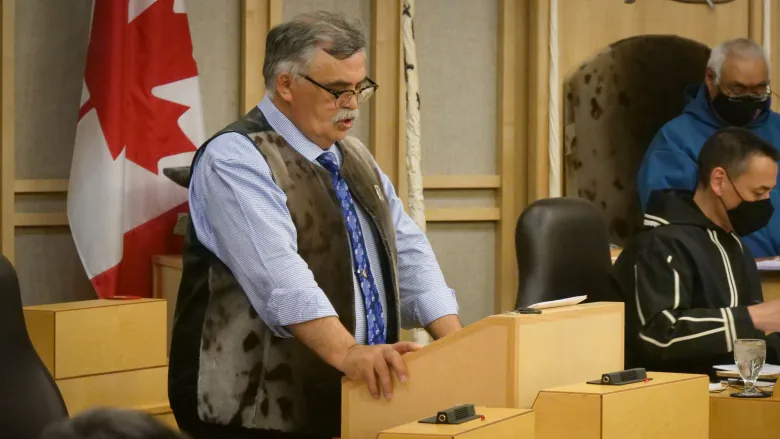Nunavut housing minister says COVID-19, costs to blame for 2021 tendering delays

Nunavut’s housing minister says COVID-19 and high costs are why the Nunavut Housing Corporation delayed awarding tenders to build housing units last year.
A CBC News investigation found the housing corporation took around two months, on average, to award or cancel tenders last year.
In one case, the delays led to a contractor backing out of a 10-unit Taloyoak project because the housing corporation took so long to award the contract, with building costs spiking in the meantime.
“There are things called due and normal process, where it takes two to three weeks during a normal time, but when these contracts were cancelled, you have to realize and think back that it was during COVID when times were absolutely different,” Lorne Kusugak told MLAs last week when the issue came up in the Legislature.
“We had people that could not come to work, we had people who had to work from home, we had people who were not able to work because of COVID, and these are not excuses. They are actually varied reasons why we were going through not normal times and these were not typical contracting times. They were trying, but cost was the primary factor.”
Speaking to CBC News, Kusugak said the Nunavut Housing Corporation had the right to take longer than normal to award tenders.
“Last year was not a normal year. The housing corporation were short-staffed, they had COVID happening, we had a lot of work that had to be done,” Kusugak said.
“In a normal year it takes two, three to four weeks or whatever. But in a non-normal year, which was the last couple years, it took longer than it should.”
Iqaluit contract clarity
Kusugak also insisted the $10-million bid for a 16-unit project in Iqaluit was, in fact, withdrawn by the company that placed it.
During the course of CBC’s investigation, the housing corporation claimed the company, Nunavut Excavating, had withdrawn its low-bid for the Iqaluit project. But the company told CBC News it had not withdrawn its bid.
The contradiction raised questions about whether housing officials had been disingenuous with the public when asked by MLAs last year about why the tender was cancelled.
“I’ve seen and I have a letter from the owner of the company asking that they move forward from these tenders by the contractor due to grossly underestimated costs for the projects that this company had bid on. That came from the company,” Kusugak told the Legislature.
The issue around whether the bid was withdrawn or not also raised questions about whether the housing corporation claimed the bid bond if the bid was withdrawn within the tender period.
When a company bids on a project for more than $250,000, it’s required to submit a bid bond. Those can be either in the form of a five per cent deposit of the tender price, or a 10 per cent bond in a form approved by the Treasury Board.
Contractors who spoke with CBC News say the mechanism is to ensure companies are held accountable for their bids.
Speaking to CBC News, Kusugak confirmed they did not claim the bid bond when the company requested its bid be withdrawn.
“The companies are struggling. You have to realize this is happening during COVID, and companies are struggling to make payroll and make ends meet. They’re struggling just as much as anybody else out there to run a private business,” Kusugak said.
“And [the Nunavut Housing Corporation], I believe, I wasn’t the minister at the time, but I believe that they felt it was a fair mistake by the company that put a bid out there. And they made an honest mistake and it was a big error I assume on their part, and they asked us if we could withdraw their bid without penalty and so that was obliged.”
CBC News was unable to reach the owner of Nunavut Excavating to clarify whether he did, in fact, ask for the bid to be withdrawn. Messages left for him with employees at the company’s office were not returned.
All housing tenders this year have been cancelled because of high costs.
Related stories from around the North:
Canada: Government in Canada’s Arctic Nunavut territory shelves infrastructure, housing projects over construction costs, CBC News
Norway: Thawing permafrost melts ground under homes and around Global Seed Vault in Svalbard, The Independent Barents Observer
Russia: 30–50% of critical northern infrastructure could be at high risk by 2050 due to warming, says study, Eye on the Arctic.



